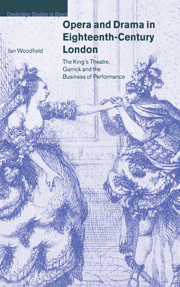 Opera and Drama in Eighteenth-Century London
Opera and Drama in Eighteenth-Century London Published online by Cambridge University Press: 22 September 2009
Gabrielli's sensational season marked a turning point in the fortunes of the opera house. With financial stability now achieved, the King's Theatre began to develop into a flourishing concern, a fact recognised by critics and supporters alike. Brooke, moreover, was steadily gaining in confidence as a manager. Indeed, the forceful manner with which the first crisis of the new season was resolved suggests that she was beginning to gain a degree of ascendancy over her singers.
Finding a worthy successor to Gabrielli was always going to be difficult, but it soon became evident that Brooke's choice, Anna Pozzi, was likely to fail. She arrived in the autumn of 1776 and first impressions at least were favourable. She was deemed ‘young, handsome, and possessed of a voice uncommonly clear, sweet, and powerful’. Twining was visiting London, and Burney tried to persuade him that he would like her. He replied: ‘I shall forgive her a great deal, if she will but get at my entrailles now & then.’ Pozzi, however, was obviously inexperienced, both as a singer and an actress, and she was superseded by Cecilia Davies ‘before the season was far advanced’. This was to place a very kind interpretation on her undignified demotion, for seldom can a ‘first’ singer have been ditched so rapidly as was the unfortunate young Italian.
To save this book to your Kindle, first ensure [email protected] is added to your Approved Personal Document E-mail List under your Personal Document Settings on the Manage Your Content and Devices page of your Amazon account. Then enter the ‘name’ part of your Kindle email address below. Find out more about saving to your Kindle.
Note you can select to save to either the @free.kindle.com or @kindle.com variations. ‘@free.kindle.com’ emails are free but can only be saved to your device when it is connected to wi-fi. ‘@kindle.com’ emails can be delivered even when you are not connected to wi-fi, but note that service fees apply.
Find out more about the Kindle Personal Document Service.
To save content items to your account, please confirm that you agree to abide by our usage policies. If this is the first time you use this feature, you will be asked to authorise Cambridge Core to connect with your account. Find out more about saving content to Dropbox.
To save content items to your account, please confirm that you agree to abide by our usage policies. If this is the first time you use this feature, you will be asked to authorise Cambridge Core to connect with your account. Find out more about saving content to Google Drive.